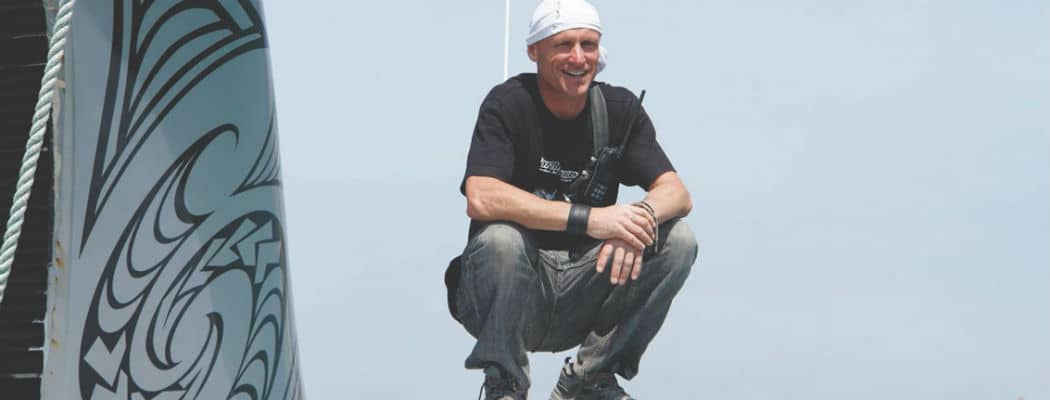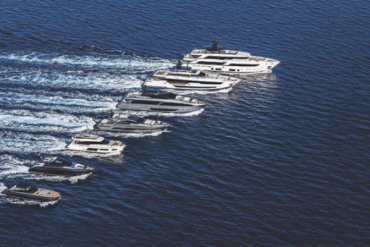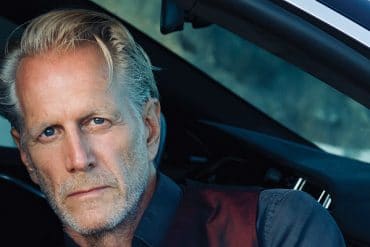Controversial conservationist Pete Bethune visits Nantucket and condemns local efforts to abate seals.
 Pete Bethune takes environmental activism to a new level: He is not your typical conservationist. He’s chased rhino poachers in Sumatra, conducted a citizen’s arrest of a Japanese whaling ship captain in Antarctic waters, clandestinely filmed baby seal clubbings in a DeBeers diamond mine in Namibia and embarked on many more adrenaline-filled eco-adventures while filming the first two seasons of his television show, The Operatives. In 2006, Bethune set a new world record, circumnavigating the globe in a state-of-the-art vessel powered entirely by bio-fuels. To publicize the fact that sustainable biofuels could replace hydrocarbon fuels, Bethune and his crew had liposuction and used their own body fat as part of their boat’s fuel. Now, Bethune is crowd-funding to build a new 150-foot, tri-hull, wave-piercing vessel to continue his eco-mission crisscrossing the globe.
Pete Bethune takes environmental activism to a new level: He is not your typical conservationist. He’s chased rhino poachers in Sumatra, conducted a citizen’s arrest of a Japanese whaling ship captain in Antarctic waters, clandestinely filmed baby seal clubbings in a DeBeers diamond mine in Namibia and embarked on many more adrenaline-filled eco-adventures while filming the first two seasons of his television show, The Operatives. In 2006, Bethune set a new world record, circumnavigating the globe in a state-of-the-art vessel powered entirely by bio-fuels. To publicize the fact that sustainable biofuels could replace hydrocarbon fuels, Bethune and his crew had liposuction and used their own body fat as part of their boat’s fuel. Now, Bethune is crowd-funding to build a new 150-foot, tri-hull, wave-piercing vessel to continue his eco-mission crisscrossing the globe.
During his recent travels, Pete Bethune came to Nantucket to learn about local environmental issues and to explore the potential for future projects here at the invitation of a member of the Nantucket Marine Mammals Conservation Program. After several days exploring the island and meeting with local fishermen, politicians and conservationists, Bethune shared his thoughts when it comes to managing our island’s seals.
N MAGAZINE: How did you end up coming to Nantucket?
BETHUNE: I wasn’t going to come, but then [Scott Leonard of the Nantucket Marine Mammals Conservation Program] mentioned the issue here over the seals. That pricked my ears up. I did just a little bit of digging, and I went to the Seal Abatement Coalition’s website. And I think it’s appalling what they’ve been proposing. I see it as trying to roll back the Marine Mammal Protection Act, and I think that’s been a key piece of legislation in saving seal populations. So I thought I would come out here and meet with Scott and maybe meet with some of the locals and discuss the issues.
N MAGAZINE: What’s your experience with seals?
BETHUNE: I’ve worked on seal issues before, in New Zealand and Namibia. In Namibia, the first mission I did for The Operatives was to break into a DeBeers diamond mine where they club about fifty thousand seal pups a year. Because it’s a diamond facility, it’s very heavily guarded and the seal clubbing is almost impossible to film or photograph. So we had to covertly sneak in. We got dropped off a mile off shore, swam in, spent four days dodging these patrols, and on the fourth day were able to get some seal clubbing footage. It’s appalling what they do there; it’s disgraceful. The footage has been used all around the world and in several documentaries in addition to the TV show. I feel pretty strongly about seals, they’re an important part of healthy ecosystems.
 N MAGAZINE: What have you learned so far about seals on Nantucket?
N MAGAZINE: What have you learned so far about seals on Nantucket?
BETHUNE: Thirty years ago there were zero seals on Muskeget Island, and today, at the peak of winter, there may be as many as fifteen thousand. You’ve got these locals trying to get the fisherman on their side by telling them the seals are impacting the fishery in a negative way, and we’ve got to do something about these excess number of seals. But what they’re doing is using a very short piece of history to justify it. They’re going back thirty years when there were zero seals. If you go back two hundred years, there were probably 100,000-200,000 seals here. It’s pretty disingenuous to say, because there were no seals a while ago, and now having fifteen thousand is too many. They keep using language like “the burgeoning seal population” or “the exploding seal population” as though that’s a bad thing, when it’s not a bad thing at all.
N MAGAZINE: You believe the growing seal population is a good thing for Nantucket?
BETHUNE: Yeah, seals have made a comeback and a few reasons have been used to trigger alarm. People are saying the seals attract great white sharks. You know great white sharks are part of this ecosystem? They’ve become critically endangered and nearly hunted to extinction. They are starting to make a comeback now partly because of the seals. And I think we should be celebrating that.
If they start actually culling seals, this place will become a hotbed for activism. You wouldn’t be able to stop people from flying their drones and showing bloody seals on the beaches. In many ways, a place like Nantucket should be an environmental leader. This is an eco hot spot here; it’s got such great biodiversity. You’ve got the sea monument just off shore that President Obama just declared. You’ve got these tropical waters with whale sharks and mahi mahi, blue marlin and all manner of tropical fish. You come in closer and you’ve got these sub-tropical waters with amazing seals and great whites. It’s an ecological hotspot, and the future of an area like Nantucket and Muskeget Island is in celebrating the wildlife you have, not in trying to control it.
N MAGAZINE: So what would you say the core of your work is?
BETHUNE: It’s a combination. Much of it is running missions to catch people who are doing illegal activities. Or running missions in places where it may not be illegal, but I believe it’s wrong. For example, the seal clubbing in Namibia is legal, as well as Japanese whaling in Antarctica. Increasingly, I’m trying to work with authorities and be on the right side of the law. But there are some cases where I think it’s justified to say, “Hey, the law is wrong here.”
N MAGAZINE: You must have a good legal team.
BETHUNE: Yeah, but mostly we try not to get caught. Mostly I work with authorities, but I’m not afraid to push the boundaries. An example would be in Costa Rica. We got some intel on some vessels involved in illegal shark finning. Myself and another guy dove using reed breathers, a military underwater gear that has no bubbles and climbed aboard the shark finning boats to put turtle trackers on them. Technically, it was illegal for us to do that. But it gave us an enormous amount of intelligence of where they were going and how they were operating. It led us all the way out to Cocos Island. Sometimes I might push the boundaries a bit, but I do try and work with authorities.
 N MAGAZINE: What’s another issue facing our Nantucket waters?
N MAGAZINE: What’s another issue facing our Nantucket waters?
BETHUNE: The fact that you have these draggers that are allowed to fish so close to the mainland is disgraceful. I don’t know any other Western countries in the world that would allow draggers that close to shore. At the very least they should be twelve nautical miles offshore. That form of fishing is horrendous. When you’re in water that shallow, the drag net effectively takes the entire water column from the surface down to the bottom. The by-catch is enormous and you end up with all these dead animals. And people here are complaining that fishing is not what it used to be, and they blame it on the seals. It’s not the [expletive] seals! It’s the fact that you’re overfishing here. You have all these outdated fishing practices. They’re dragging using a one and seven eights inch mesh net. I don’t know another single Western country that allows a mesh size under four inches. In this case, they’re allowed a liner. It catches everything.
N MAGAZINE: How do you think these is- sues can be better brought to the public eye?
BETHUNE: In many
ways, this area should be a genuine environmental leader. You have Woods Hole, just over the water there, which is one of the greatest oceanic research institutes in the world; you’ve got these tropical waters fifty to sixty miles offshore with some of the most extraordinary concentrations of fish in the world and you’ve got this brutal windswept island at the edge of the United States. This is an extraordinary place and it should be an environmental leader. A lot of the people on Nantucket, they are environmentalists at heart. They live in one of the coolest places in the world, this wonderful little island placed on the edge of Atlantic here with all this wildlife around it. I think people here do care and they might just need a little nudge along the way.
Learn more about The Operatives and Pete Bethune’s organization, Earth Race Conservation, by clicking here.
COUNTER POINTS
The founder of the Seal Abatement Coalition, Peter Howell, responds to Pete Bethune.
 I am a founder of the Seal Abatement Coalition, yet, like Mr. Bethune, I certainly consider myself an environmentalist and believe I have the credentials to support that claim. I agree with much of what Mr. Bethune says. No doubt the Marine Mammal Protection Act has, as he says, been key to saving seal populations, and I applaud that. But that act was passed over forty years ago when preserving individual species was, arguably, the principal objective. That was, and remains, a legitimate objective, but I believe we have since come to recognize that we must balance specific species preservation with preservation of the ecosystem as a whole.
I am a founder of the Seal Abatement Coalition, yet, like Mr. Bethune, I certainly consider myself an environmentalist and believe I have the credentials to support that claim. I agree with much of what Mr. Bethune says. No doubt the Marine Mammal Protection Act has, as he says, been key to saving seal populations, and I applaud that. But that act was passed over forty years ago when preserving individual species was, arguably, the principal objective. That was, and remains, a legitimate objective, but I believe we have since come to recognize that we must balance specific species preservation with preservation of the ecosystem as a whole.
Our concern is that in the current absence of natural controls over grey seal population growth in our waters (other than white sharks), human intervention in the form of the extraordinary protections afforded grey seals under the MMPA is now contributing to an emerging natural imbalance. As one example, our short documentary film, unintended Consequences, documents the impact grey seals are having on the unique and fragile ecosystem of Muskeget Island, a National Natural Landmark.
We certainly do not advocate “rolling back” the Marine Mammal Protection Act. We do believe the act is flawed in that it does not provide for delisting species, which have demonstrably recovered, as does the Endangered Species Act. I agree with Mr. Bethune that we should celebrate the grey seal recovery, but I question whether NOAA is reluctant to acknowledge that recovery because the act is silent on the regulator’s responsibilities for managing marine mammal populations that have been restored to a sustainable level.
Mr. Bethune raises the difficult issue of “shifting baselines” in discussing an appropriate historical point of reference for determining what is a “natural” grey seal population. Suffice it to say, changes in our marine ecosystem, both natural and man-made, (e.g., the effects of climate change, human population growth, industrial commercial fishing techniques, etc.,) make such determinations difficult. What may have been a “natural” grey seal population in any specific locale generations ago may no longer be relevant today.
Finally, I agree we have an “eco-hotspot” here, and it is precisely in the interests of preserving our biodiversity that we are concerned about the unchecked growth of our grey seal population and its impact on our marine ecosystem.






